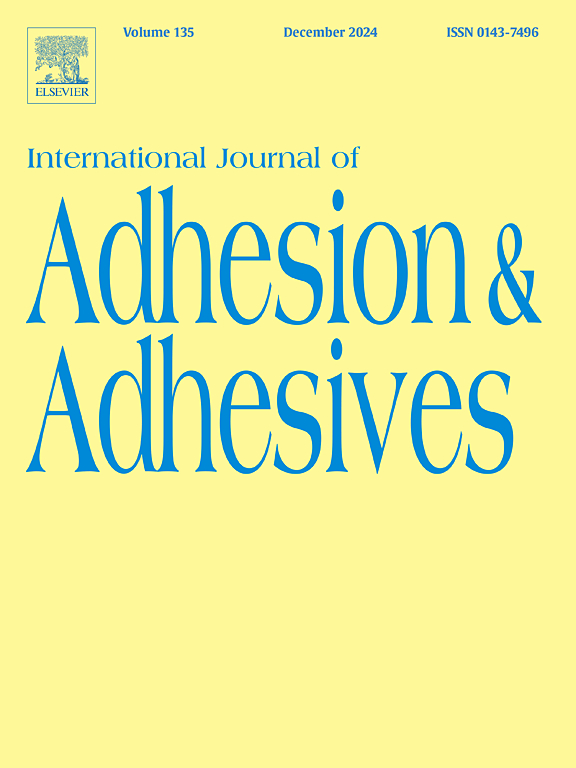Bonding of beech wood to mortar with a novel epoxy hybrid-adhesive: Performance in dry and wet conditions
IF 3.2
3区 材料科学
Q2 ENGINEERING, CHEMICAL
International Journal of Adhesion and Adhesives
Pub Date : 2024-10-22
DOI:10.1016/j.ijadhadh.2024.103868
引用次数: 0
Abstract
Composites made of timber and cementitious materials require a rigid connection to exploit their full composite action, which can be achieved by using full-surface adhesive bonding. In this work, we investigated a novel hybrid-adhesive system consisting of a silane-terminated polyurethane (STP) and epoxy resin for the bonding of beech wood timber to fresh mortar for use in timber-mortar composites (TMC). The mechanical performance and the influence of moisture on TMC produced by the wet-in-wet process (fresh mortar) was investigated and compared to the bonding of prefabricated mortar (prefab process). The STP-epoxy hybrid-adhesive showed a suitable bonding performance of beech wood to both, fresh mortar and precured mortar with median compression shear strengths of 4.57 MPa and 6.07 MPa, respectively. The fracture pattern showed the strength of the near-surface layer in the mortar, close to the adhesive, being often decisive for the bond performance. The same failure mode predominated in TMC beams after 3-point bending tests. The stability of the composite upon the influence of moisture is especially challenging when using beech wood due to its low dimensional stability. Thus, the moisture stability of the bond was investigated by compression shear tests after water immersion. It showed an improved water stability compared to composites bonded with an epoxy resin. Nonetheless, a clear reduction in bond strength compared to the dry state was observed, with delamination of 25 % of the wet-in-wet and 17 % of the prefab specimens during water immersion. Furthermore, it was seen that the adhesive open laying time played a decisive role in the wet-in-wet produced specimens influencing both, dry and wet shear strength.
用新型环氧混合粘合剂粘合榉木与砂浆:干湿条件下的性能
由木材和水泥基材料制成的复合材料需要刚性连接才能充分发挥其复合作用,这可以通过使用全表面粘合剂来实现。在这项工作中,我们研究了一种新型混合粘合剂系统,该系统由硅烷封端聚氨酯(STP)和环氧树脂组成,用于粘合榉木木材和新鲜砂浆,以用于木材-砂浆复合材料(TMC)。研究了湿中湿工艺(新鲜砂浆)生产的 TMC 的机械性能和水分的影响,并将其与预制砂浆(预制工艺)的粘合进行了比较。STP-epoxy 混合粘合剂显示了榉木与新鲜砂浆和预制砂浆的粘合性能,压缩剪切强度中值分别为 4.57 兆帕和 6.07 兆帕。断裂模式表明,砂浆中靠近粘合剂的近表面层的强度往往对粘合性能起着决定性作用。在进行三点弯曲试验后,TMC 梁的破坏模式也是如此。由于榉木的尺寸稳定性较低,复合材料在湿度影响下的稳定性尤其具有挑战性。因此,我们通过浸水后的压缩剪切试验研究了粘合剂的湿稳定性。结果表明,与使用环氧树脂粘合的复合材料相比,水稳定性有所提高。不过,与干燥状态相比,粘接强度明显降低,在浸水过程中,湿中湿试样和预制试样分别有 25% 和 17% 的脱层现象。此外,还发现粘合剂的开放铺设时间对湿入湿试样的干湿剪切强度都有决定性的影响。
本文章由计算机程序翻译,如有差异,请以英文原文为准。
求助全文
约1分钟内获得全文
求助全文
来源期刊

International Journal of Adhesion and Adhesives
工程技术-材料科学:综合
CiteScore
6.90
自引率
8.80%
发文量
200
审稿时长
8.3 months
期刊介绍:
The International Journal of Adhesion and Adhesives draws together the many aspects of the science and technology of adhesive materials, from fundamental research and development work to industrial applications. Subject areas covered include: interfacial interactions, surface chemistry, methods of testing, accumulation of test data on physical and mechanical properties, environmental effects, new adhesive materials, sealants, design of bonded joints, and manufacturing technology.
 求助内容:
求助内容: 应助结果提醒方式:
应助结果提醒方式:


